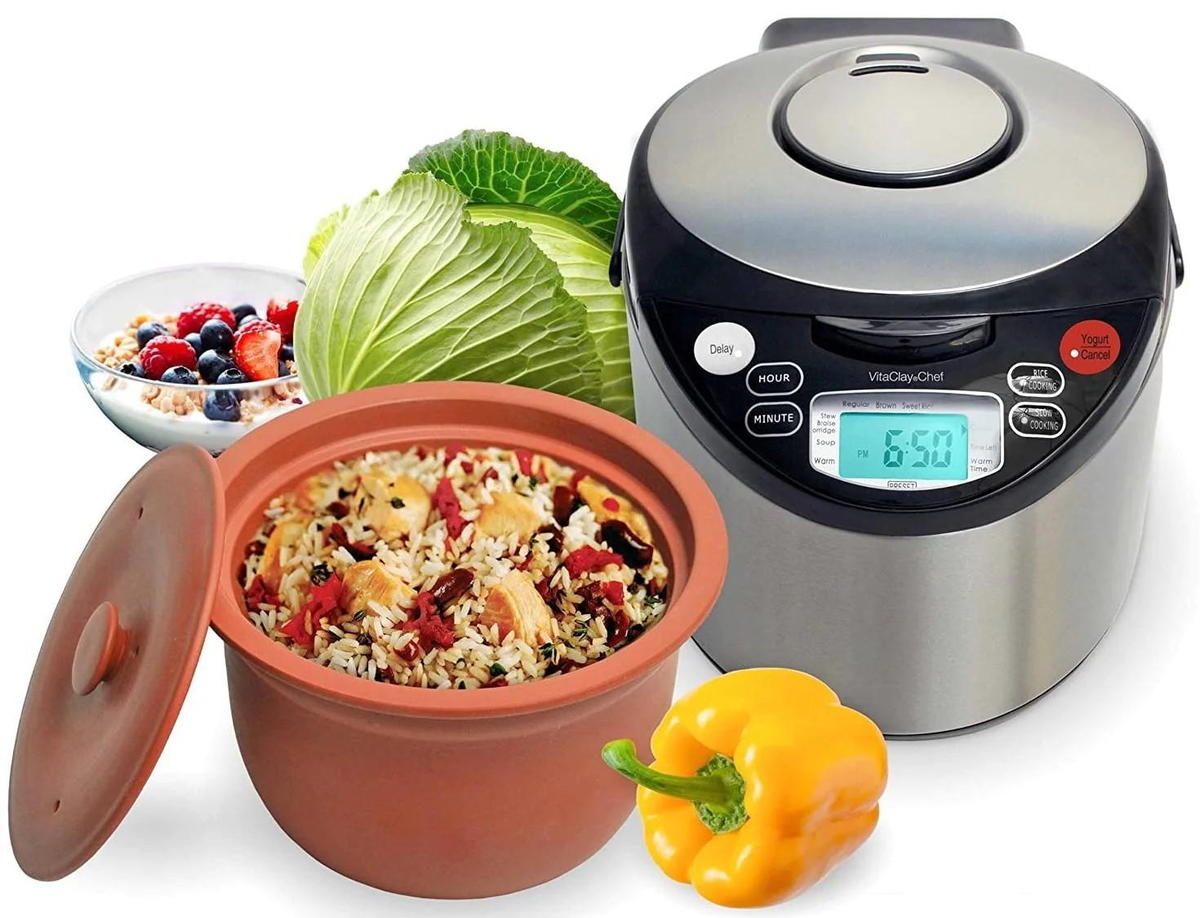
10 Foods to Help You Fight Diabetes
by Michael Gonzalez, Ph.D.,
new contributor Healthy Referral Newspaper
Courtesy Healthy Referral Newspaper. www.healthyreferral.com [email protected] /
Order our preventive health report..ebook or hard copy
top doctors/authors on heart, cancer, anti aging. 22 jammed packed pages.
Ebook zell $9 to [email protected] / hard copy in US zell $15 to [email protected] and email us at [email protected] your shipping address. 216—533-2273
Easy way to eat healthy and have an amazing taste with an ancient clay pot cooker

https://vitaclaychef.com/?rfsn=1429246.d4cef4&utm_source=refersion&utm_medium=affiliate&utm_campaign=1429246.d4cef4
Coupon code to save 10% HR10
---------------------------------------------------------------------------------------------------------------------------------------------------------------------------------
Dr. Michael J Gonzalez
Dr. Michael J. Gonzalez, DSc, NMD, PhD, FANMA, FACN is a Professor at the Nutrition Program, School of Public Health in the Medical Sciences Campus, University of Puerto Rico and Adjunct faculty at the Universidad Central del Caribe School of Medicine and EDP University Program of Naturopathic Sciences. He is a Fellow of the American College of Nutrition and has authored over 250 scientific publications. Dr. Gonzalez was inducted to the International Orthomolecular Medicine Hall of Fame in 2016. See bio at http://itmltd.com/ITM-BIO-Dr.-Michael-J.-Gonzalez,-PhD-(ITM-Group-Orthomolecular-and-Nutritional-Biochemistry-Medicine-Advisor).pdf
Dear friends, here a short briefing on foods to help you with your diabetes. In general, a diet rich in vegetables and fruits, low in refined and process carbohydrates, and accompanied by healthful proteins can have significant benefits for people with diabetes. It will help you maintain health, improve overall well-being, and prevent complications.
Diet for Diabetes
People with diabetes can manage their blood sugar levels by making correct food choices! Both sugary and starchy carbohydrates can raise blood sugar levels. Include vegetables and fruits that are low in sugar such as berries. Eat lean protein. Choose foods with no added sugar. Avoid trans fats.
1. Green Leafy Vegetables
Green leafy vegetables are full of essential vitamins, minerals, and nutrients. They also have minimal impact on blood sugar levels. Leafy green vegetables, including spinach and kale, are a key plant-based source of potassium, vitamin A, and calcium while also providing fiber, a high antioxidant content, and starch-digesting enzymes. You can include green leafy vegetables in salads, side dishes, soups, and dinners. Combine them with
a source of lean protein, such as chicken, fish or tofu. Suggestions: Spinach, Collard Greens, Kale, Cabbage, Bok Choy, Broccoli
2. Whole Grains
Whole grains contain high levels of fiber and more nutrients than refined white grains. Eating a diet high in fiber is important for people with diabetes because fiber slows down the digestion process that helps keep blood sugar levels stable. Whole wheat and whole grains are lower on the glycemic index (GI) scale than white breads and rice. This means they have less of an impact on blood sugar. Suggestions: Brown Rice, Whole-Grain Bread, Whole-Grain Pasta, Buckwheat, Quinoa, Millet, Bulgur Rye
3. Fatty Fish
Fatty fish is a healthful addition to any diet. Fatty fish contains important omega-3 fatty acids called eicosapentaenoic acid (EPA) and docosahexaenoic acid (DHA). These fats to promote both heart and brain health. You can eat seaweed, such as kelp and spirulina, as plant-based alternative sources of these fatty acids. Instead of fried fish, which contains saturated and trans fats, try baked, roasted, or grilled fish. Pair with a mix of vegetables for a healthful meal choice. Suggestions: Salmon, Mackerel, Sardines, Tuna, Herring, Trout
4. Beans
Try adding kidney beans to a salad! Beans are an excellent food option for people with diabetes. A source of plant-based protein, they can satisfy the appetite while helping people reduce carbohydrate intake. Beans are also low on the GI scale and are good for blood sugar regulation. They are a complex carbohydrate, so the body digests them slower than it does other carbohydrates. Eating beans can also help with weight loss and help regulate a person’s blood pressure and cholesterol. Beans also contain important nutrients, including iron, potassium, and magnesium. A highly versatile food choice, a variety of beans can be included in a chili or stew, or in tortilla wraps with salad. When using canned beans, be sure to choose an option with no added salt. Otherwise, drain and rinse the beans to remove any added salt. Suggestions: Kidney Beans, Pinto Beans, Black Beans, Navy Beans, Adzuki Beans
5. Nuts
Nuts are another excellent addition to the diet. Like fish, nuts contain healthful fatty acids that help keep the heart and brain healthy. Walnuts are especially high in omega-3 fatty acids and in a nutrient called alpha-lipoic acid (ALA) which is important for good heart and liver health. ALA also helps control blood sugar. Walnuts also provide key nutrients such as protein, vitamin B-6, magnesium, and iron. Try adding add a handful of walnuts to breakfast cereal or to a mixed salad. Suggestions: Walnuts, Almonds, Brazil nuts, Cashews, Hazelnuts, Macadamia nuts, Pecans, Pistachios
6. Citrus fruits
Citrus fruits such as oranges, grapefruits, and lemons have glucose lowering properties. Eating citrus fruits is a great way to get vitamins such as vitamin C and vitamin A as well as minerals such as magnesium and potassium. They also contain two bioflavonoid antioxidants, hesperidin and naringin, that have antidiabetic effects. Suggestions: Oranges, Lemons, Limes, Grapefruits
7. Berries
Berries are full of antioxidants that can help prevent oxidative stress and oxidation damage. Oxidative stress and its damage are linked to a wide range of health conditions including heart disease and cancer. Oxidative stress occurs when there is an imbalance between antioxidants and unstable molecules called free radicals in the body. All berries contain high levels of antioxidants and fiber. They also contain important other vitamins and minerals, such as vitamin C, vitamin K, manganese, and potassium. Add fresh berries to your breakfast routine, eat a handful as a snack, or use frozen berries in a smoothie. Suggestions: Blueberries, Blackberries, Strawberries, Raspberries, Acai berries, Cranberries
8. Sweet Potatoes
Sweet potatoes have a lower GI than white potatoes. This makes them a great alternative for people with diabetes, as they release sugar more slowly and do not raise blood sugar as much. Wash them well and consume the skin which is high in fiber. Sweet potatoes are also a great source of vitamin A, vitamin C and potassium. You can enjoy sweet potatoes in a range of ways, including baked, boiled, roasted, or mashed. For a balanced meal, eat them with a source of lean protein and green leafy vegetables or a salad.
9. Probiotic Yogurt
Probiotics are the helpful bacteria that live in the human gut and improve digestion and overall health. Moreover, eating probiotic yogurt could improve cholesterol levels in people with type 2 diabetes, and may reduce inflammation and oxidative stress as well as increase insulin sensitivity. You can choose a natural yogurt, such as Greek yogurt, with no added sugar. A probiotic yogurt will contain live and active cultures called Lactobacillus or Bifidobacterium. You can add berries and nuts to yogurt for a healthful breakfast or dessert.
10. Flaxseed
Flaxseeds are an incredibly healthy food. Also known as common flax or linseeds, flaxseeds have a high content of heart-healthy omega-3 fats, fiber, and other unique plant compounds. A portion of their insoluble fiber is made up of lignans, which may help decrease heart disease risk and improve blood sugar management. Flaxseed is beneficial for your heart and gut health and may also help lower blood pressure. In addition, flaxseeds are very high in viscous fiber, which improves gut health, insulin sensitivity, and feelings of fullness. You may purchase ground seeds or grind them yourself. It’s also important to keep flaxseeds tightly covered in the refrigerator to prevent them from going rancid. Flaxseeds may help reduce inflammation, lower heart disease risk, decrease blood sugar levels, and improve insulin sensitivity.
I hope these recommendations help you achieve your goals of attaining a healthy approach toward diabetes!
Until the next time…
Michael J. Gonzalez, DSc, NMD, PhD, FANMA, FACN
Sources
https://www.medicalnewstoday.com/articles/324416
https://www.healthline.com/nutrition/16-best-foods-for-diabetics
https://www.menshealth.com/nutrition/a19529909/12-diabetes-powerfoods/
Ask about Dr Gonzalez for presentations, conference calls, concierge health, corporate newsletters/wellness initiatives: [email protected]
